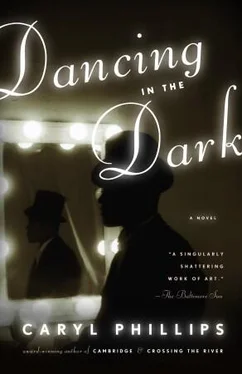If George could see him in this blackbird costume he would most likely refrain from making any statement that related to his friend’s condition, but his opinion would be evident from his demeanor. Now it is too late. In his final months poor George could not even recognize his friend and partner. Death scratched at George’s door for a long time before finally easing it open, luring George through and then escorting him away to another place. Before George’s final emptiness, Bert remembered long hours spent with George in silence, his partner moving in and out of lucidity, incapable of recognizing him one moment, and the next unleashing a torrent of conversation that overpowered him with its intensity and clarity. At such moments he liked to imagine that maybe everything would eventually be all right with his partner, but then, as suddenly as it had begun, the flood of conversation would end and silence would fall between them like an iron sheet. And this new silence was always more painful than the original silence, for he had not only briefly glimpsed what he now fully understood to be lost, but he had deceived himself. And then Aida would enter the room and barely acknowledge him as she moved toward George, whose eyes always lit up on seeing his wife. Standing deliberately between Bert and her husband she would stroke George’s hair and speak softly to him, before turning and leaving again without saying anything to her husband’s partner. After Aida’s departure he would continue to sit and keep George company in the hope that there might be another outburst of conversation, and then the scratching ceased, and death eased open the door and George passed through and was escorted to another place. It was not unexpected, but death arrived hastily and it was Mother who entered Metheney’s Bar and discovered Bert sitting at his small table in the far corner of the badly illuminated establishment. For a moment the patrons all looked up in astonishment, for this finely dressed lady who carried herself with pride was not what they were used to. However, as she looked around, and then began to move toward her husband, they understood and lowered their heads. He looked up at her, but there was no need for her to say anything for he had already guessed what news had brought her into his sanctuary. “George?” His wife nodded and dropped her delicate hand onto her husband’s shoulder, but he ignored her and slowly raised his glass to his parted lips and took another drink. Mother turned and left him alone, but before she had even passed out of Metheney’s, Clyde D had moved around from behind the bar and refilled Mr. Williams’s glass. Bert lifted the now full tumbler of whiskey to his lips, feeling a sudden lethargy as he did so. He could sense it in his blood that some part of his life had just veered off track, and he knew that things would never again be the same. Without George he could look forward to some hard sledding. Solo sledding. Eighteen years with Mr. George Walker as his partner had left him woefully unprepared for life as a single with, or without, a black-bird costume.
He stares helplessly at the audience as though peering at them through a pane of sharply frosted glass. He can see that out there in the auditorium it is winter, and he feels sure that it must be bitterly cold. He listens carefully to the howling wind, and he knows that night will soon fall. Here, onstage, he shivers for the imaginary window is badly fitted and a gale rattles the frame. He lifts a white-gloved hand to his face and blocks the dazzling light from his eyes, and then he reaches with his other hand, also gloved, and clasps the collar of his threadbare jacket and pulls the material tight around his exposed neck. Who are these people who are staring at this lonely Negro in the window? Clearly they recognize him. However, the bemused looks on their faces suggest that they also feel pity for him, but who are they? It is winter in America. Two bright triangular cones of light cut through the darkness above these people’s heads. He looks up and sees the frantic movement of particles that dance like insects, small microscopic objects that swirl and eddy in the bright light. In the midst of the chilly silence this furious activity fascinates him, and he finds it difficult to tear his eyes from this drama. And then he sees his own reflection suspended in the window; a tall disheveled man stares back at him, one gloved hand to his face, the other to his collar, and he sees the true misery of his own condition and shame strikes him a quick hard blow. But this will be the last time, for never again will he be called upon to stand on the stage of the New Amsterdam Theatre and look out at these eighteen hundred fun-seeking society people. Mr. Ziegfeld has tried to persuade him otherwise, but Ziggy has finally accepted his colored star’s decision and informed the always eager press, who have in turn told the world. Next year’s offering, the Follies of 1920, will not be graced with the comic bonus of an awkward Negro entertainer who is so clumsy that he cannot walk without dragging his heavy feet; the Follies of 1920 will be deprived of a Negro whose speech is such that it appears that he possesses only the most rudimentary grasp of the English language. Sadly, there will be no colored fool who is so stupid that even the most ignorant among the audience seated in the orchestra stalls will not be able to both pity him and feel superior to him. The Follies of 1920 will be an altogether different entertainment and he feels relief, for it is time to step back and away from his own reflection and save himself. As the wind outside howls he composes himself. The ripple of applause begins to cloud and then rise, and he screws up his eyes and sees that those in the orchestra stalls, and those few in the balcony whose complexions resemble his own, are stirring themselves and climbing to their feet. He bends formally, from the waist, but he keeps his eyes focused on the shower of dancing particles in the two bright cones of light that bully their way through the darkness. Never still, always moving, unable to find peace, their dizzying itinerance fascinates him. Unbending himself at the waist, he stands tall and looks out at the audience, and then he bows again knowing that after nine years his time with Ziggy’s Follies is finally at an end. However, he understands that in this theater there will always be motion and unrest in these cones of light, and even after he is gone from this place there will remain some form of silent activity that will always mirror the disquieted movement of his heart with particles leaping first one way, and then the next, invisible to these people’s eyes, yet dancing just above their heads. He listens until he can endure no more of the ill wind, or the storm of their approval, and he begins now to wave one gloved hand in their direction and move backward, his eyes all the while focused on his wintry view and the swirling tempest of floodlit activity. Never again will he stand on the stage of “the house beautiful” and look out through this particular window. The journey is over, and all that remains is for him now to seek a place of shelter.
With a single turn of the oversized key he unlocks the dressing room door and slumps down onto the wooden chair. There is no name on the door, only a dull yellow star, but they know to leave him alone if the door is pushed to, which it nearly always is. He dabs the white towel in the china bowl of lukewarm water that the stage manager has placed on his dresser, and he then proceeds to rub his face, discoloring the towel as he does so. There is no need for him to look in the mirror. Only when he is sure that most of the cork has been removed does he stand and peel away his jacket, kick off the oversized shoes, and then collapse back down onto the uncomfortable chair. At forty-four he can feel an ominous fatigue in the deadweight of his body.
Читать дальше












